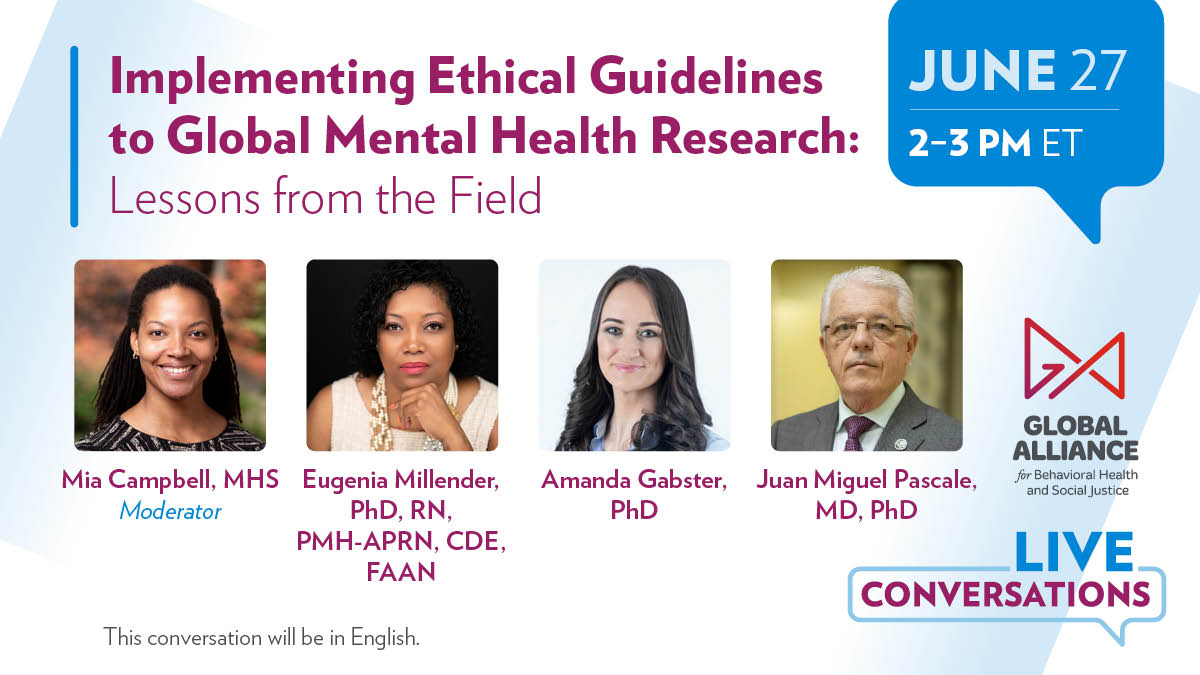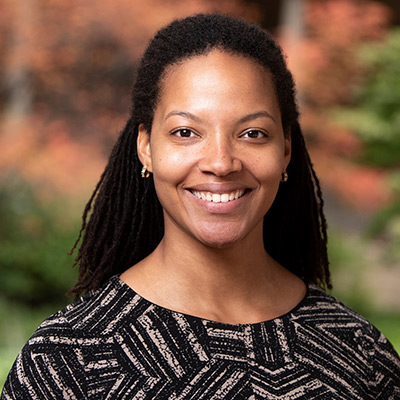
Implementing Ethical Guidelines to Global Mental Health Research
Lessons from the Field
In recent years, there has been an expansion of research conducted outside of the United States and an increase in the utilization of existing data. As a result, ethical guidelines for conducting global research have become a crucial topic of discussion.
This live conversation will discuss the complexities of conducting research outside of one’s country and provide participants with a comprehensive understanding of how ethical principles can be applied to international research. Ultimately, this webinar aims to advance ethical research practices and protect participants in international research studies.
Using the Global Mental Health Task Force’s 2021 Guidelines for Conducting Global Research: Global Alliance Perspective, the webinar will cover various aspects of ethical principles, including the role of Institutional Review Boards (IRBs) in obtaining informed consent from marginalized and vulnerable populations. Panelists will also discuss their experience implementing an international study in Panama.
Event participants will be equipped with the necessary knowledge and skills to conduct ethical research that adheres to international standards. The workshop will offer practical solutions for upholding collaborative relationships and ethical principles in their research. This live conversation will be in English.
Attendees may claim one Contact Hour of Nursing CE after attending this session and completing the online evaluation. Certificate of completion awarded upon completion of an online survey.
Meet the Speakers
Mia N. Campbell (Moderator)
Mia N. Campbell, MHS (she/her), is a Doctoral Student in Mental Health at the Johns Hopkins Bloomberg School of Public Health. As an emerging psychiatric epidemiologist and trauma-informed yoga instructor, her work has focused on exploring mental health data trends to drive community-based research and intervention efforts. These efforts aim for engagement and empowered wellness amongst adolescents and youth of marginalized and underserved populations in a global context.

Dr. Eugenia Flores Millender
Eugenia Flores Millender, PhD, RN, PMH-APRN, CDE, FAAN, is a nurse scientist who has dedicated her career to increasing access to preventative mental health services and community-engaged research. Dr. Millender is the Co-Founder and Co-Director of the Center of Population Sciences for Health Equity, Assistant Dean of Research, and a tenured Associate Professor at Florida State University (FSU) College of Nursing.

Her program of research investigates ways to reduce mental health disparities by exploring how socio-cultural stressors and trauma influence transgenerational psychological and co-occurring physical illness through gene-environment interaction among vulnerable, underserved, and marginalized populations nationally and internationally. She brings together academia and the community as equal partners in research initiatives.
Before joining Florida State University, Dr. Millender was the founding director of the Florida Atlantic University Christine E. College of Nursing Nurse-led community health center, which is the first nurse-led university health center in Florida to be designated as a Federally Qualified Health Center Look-Alike. As an experienced community-based program developer and researcher, Dr. Millender has received over $10 million in extramural funding as principal investigator (PI), multiple PI (MPI), and project director (PD) to decrease health disparities among underserved populations through community-engaged interventions.
Dr. Millender is an indigenous (Guna) Afro-Latina from the Republic of Panama. She served six years in the U.S. Army and received her BSN, MS, and PhD from Florida Atlantic University in Boca Raton, Florida. She has also earned a post-graduate certificate in psychiatric and mental health nursing from Rush University and another in Precision Medicine from the University of Florida.
Dr. Amanda Gabster
Dr. Amanda Gabster, originally from Montana, USA, moved to Panama in 2002 during her AFS Exchange program. Dr. Gabster is an epidemiologist at the Gorgas Memorial Institute for Health Studies. Since 2012, she has worked at the institute on issues of epidemiology of sexually transmitted infections, sexual health, and health equity related to vulnerable populations in Panama.

Dr. Gabster graduated in 2021 with a PhD from the Department of Clinical Research at the Faculty of Infectious Diseases at the London School of Hygiene and Tropical Medicine and in 2013 with an MS from the same prestigious UK university. She has dedicated much of her decade at the Gorgas Memorial Institute to studying the epidemiology of infections and sexual health in Panama, and she has led or coordinated eight research projects and supported another six projects on these topics, often in conjunction with her mentor in Panama, Dr. Juan Miguel Pascale. It is an honor for Dr. Gabster to serve the Gorgas Institute and the country of Panama.
Dr. Juan Miguel Pascale
Juan Miguel Pascale, MD, PhD, is a graduate of the University of Panama, with a Master’s Degree in Biomedical Sciences from the Karolinska Institute of Sweden and a PhD in Pathology from Indiana University. Dr. Pascale is currently Director of the Gorgas Memorial Institute for Health Studies and Professor of Immunology at the Faculty of Medicine of the University of Panama. He has dedicated more than thirty years to teaching students in the fields of medicine and medical technology.

Dr. Pascale’s research focuses on strengthening the epidemiological surveillance system through the early diagnosis of emerging diseases. His main objective is to provide clinical care and follow-up to patients with febrile syndromes, Leshmaniasis, and other diseases that arise in the province of Darién and among migrants who use Panama as a transit route. The program will focus on providing training to health personnel and other related entities for health monitoring of migrants, as well as on the molecular diagnosis of tropical diseases and identification of new pathogens.

